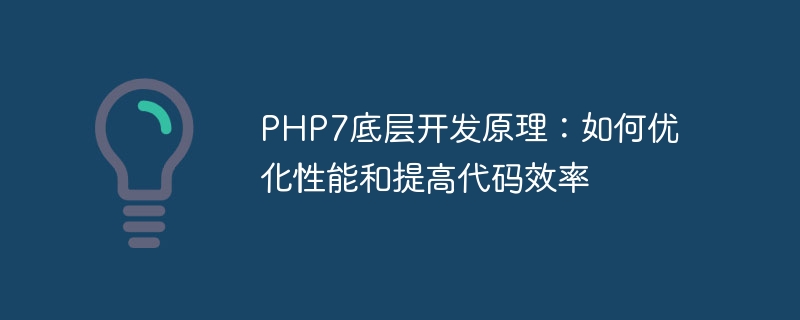

PHP7 is a general open source scripting language that is widely used in the field of web development. PHP7 introduces many new features and improvements compared to previous versions, including improved performance and code efficiency. This article will explore the underlying development principles of PHP7 and how to optimize performance and improve code efficiency.
First, let us understand some basic principles of PHP7. The engine of PHP7 uses Zend Engine 3.0, which is an efficient interpreter that can convert PHP scripts into executable machine code. Compared with the old version of Zend Engine, Zend Engine 3.0 has improvements in memory management, error handling, and garbage collection, thereby improving performance and code efficiency.
In order to optimize the performance of PHP7, we can adopt a series of strategies. First, use caching to reduce code parsing and compilation time. PHP7 introduces the OPcache extension, which can store compiled code in shared memory to speed up code execution. In addition, you can also use other caching tools such as Redis, Memcached, etc. to store frequently used data to avoid repeated calculations and database queries, thereby further improving performance.
Secondly, we can use the new features of PHP7 to optimize performance. PHP7 introduces a new scalar type declaration, including integer, floating point, Boolean and string types. By adding type declarations to the parameters and return values of functions and methods, the readability and execution efficiency of the code can be improved, while the occurrence of errors and exceptions can be reduced.
In addition, PHP7 also introduces a new exception handling method, namely Throwable and try-catch statements. Throwable is the base class of Exception and Error, which can capture a wider range of exceptions and errors, thereby providing a better error handling mechanism. By rationally using try-catch statements, we can avoid code interruption when an error occurs, thereby improving the robustness and reliability of the code.
In addition to optimizing performance, we can also improve the efficiency of the code through some techniques. First, try to avoid using global variables as they increase the coupling and complexity of your code. It is recommended to use an object-oriented approach to organize code, encapsulate data and behavior in classes, and operate data through object methods.
Secondly, avoid executing duplicate code multiple times. Duplicate code can be extracted as functions or methods and called where needed. This improves code reusability and maintainability while reducing errors caused by code duplication.
Also, avoid using too many database queries and network requests. Multiple queries can be combined into a single query, using appropriate indexes and caching to optimize database performance. For network requests, asynchronous processing and parallel processing can be used to improve efficiency and reduce waiting time.
Finally, we can also improve code efficiency by using appropriate data structures and algorithms. Choosing appropriate data structures and algorithms can reduce code execution time and memory consumption. For complex algorithmic problems, existing algorithm libraries or algorithm design patterns can be used to simplify code implementation and optimization.
In short, optimizing the performance of PHP7 and improving code efficiency require comprehensive consideration of multiple factors, including underlying development principles, caching mechanisms, use of new features, exception handling, code organization and optimization, etc. By properly applying these strategies, we can improve the performance and maintainability of PHP7 applications, thereby improving user experience and development efficiency.
The above is the detailed content of PHP7 underlying development principles: how to optimize performance and improve code efficiency. For more information, please follow other related articles on the PHP Chinese website!